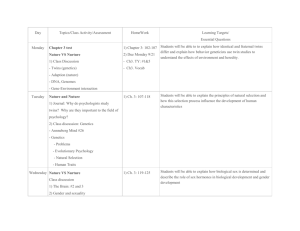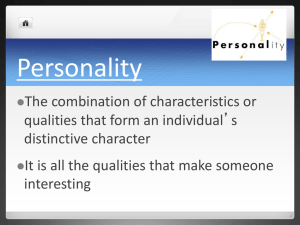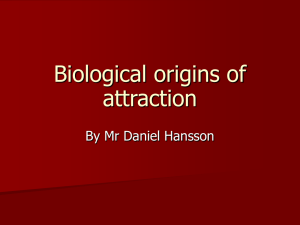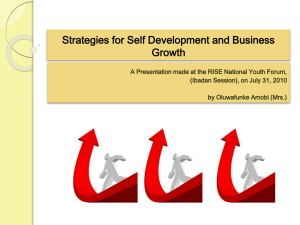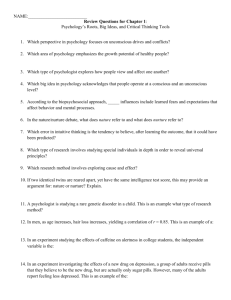File - Jake Ford`s ePortfolio
advertisement
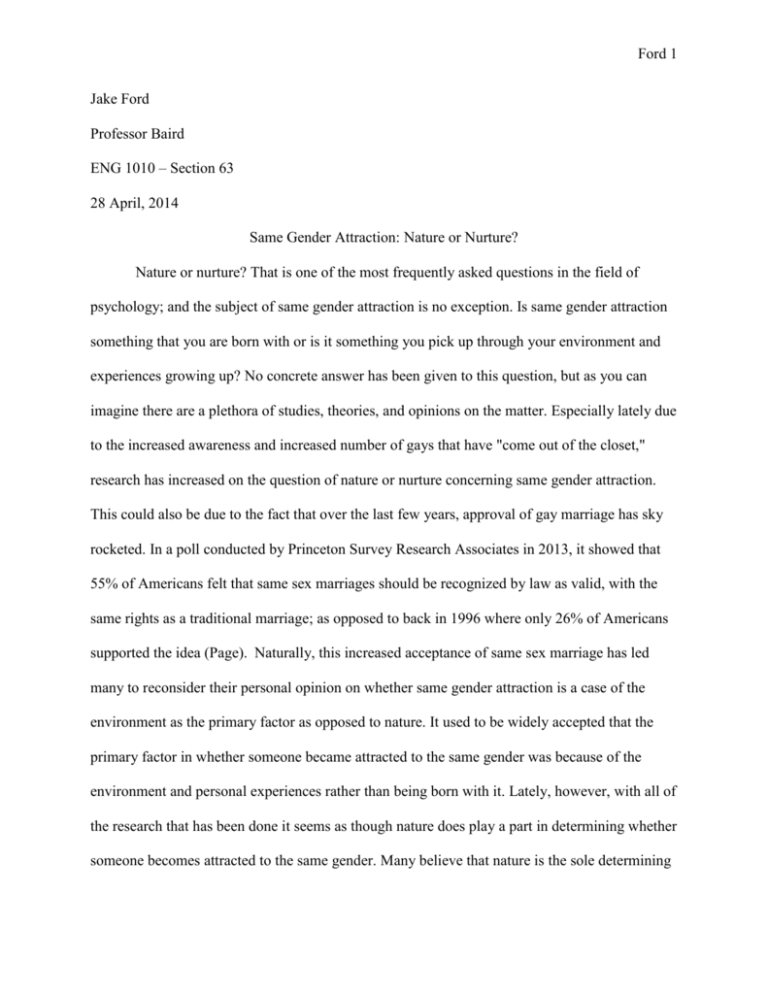
Ford 1 Jake Ford Professor Baird ENG 1010 – Section 63 28 April, 2014 Same Gender Attraction: Nature or Nurture? Nature or nurture? That is one of the most frequently asked questions in the field of psychology; and the subject of same gender attraction is no exception. Is same gender attraction something that you are born with or is it something you pick up through your environment and experiences growing up? No concrete answer has been given to this question, but as you can imagine there are a plethora of studies, theories, and opinions on the matter. Especially lately due to the increased awareness and increased number of gays that have "come out of the closet," research has increased on the question of nature or nurture concerning same gender attraction. This could also be due to the fact that over the last few years, approval of gay marriage has sky rocketed. In a poll conducted by Princeton Survey Research Associates in 2013, it showed that 55% of Americans felt that same sex marriages should be recognized by law as valid, with the same rights as a traditional marriage; as opposed to back in 1996 where only 26% of Americans supported the idea (Page). Naturally, this increased acceptance of same sex marriage has led many to reconsider their personal opinion on whether same gender attraction is a case of the environment as the primary factor as opposed to nature. It used to be widely accepted that the primary factor in whether someone became attracted to the same gender was because of the environment and personal experiences rather than being born with it. Lately, however, with all of the research that has been done it seems as though nature does play a part in determining whether someone becomes attracted to the same gender. Many believe that nature is the sole determining Ford 2 factor of same gender attraction while others still believe nurture is the primary source. Upon researching various studies that I will present in this paper, I am of the opinion that both nature and nurture play substantial roles in deciding whether someone becomes homosexual or heterosexual and don't believe that same gender attraction is determined only by nature or nurture. The fraternal birth order effect states that men show more homosexual tendencies when they have more than one older brother. This is due to a maternal immune reaction that is provoked in male fetuses (McConaghy, Hadzi-Pavlovic, Stevens, Manicavasagar, Buhrich, and Vollmer-Conna 161-174). Biological processes like this reaction could be playing a part in the future sexual orientation of the baby when he grows up into adulthood. The fraternal birth order effect makes a good case for nature being part of the deciding factor of whether a male becomes attracted to their same gender; however, the fraternal birth order effect does not seem to affect females. In a study mentioned in the psychology textbook Introducing Psychology, they showed that an identical twin to a gay male (with whom he shares 100% of his genes) has a 50% chance of becoming gay himself, whereas a fraternal twin or nontwin brother (with whom he shares 50% of his genes) has only a 15% chance of being gay (Schacter, Gilbert, and Wegner 333-334). They also mention that similar patterns have emerged in studies with women. This study shows that genetics come in to play in determining sexual orientation and gives further evidence that nature is part of same gender attraction. An identical twin of someone who is gay has a substantially higher chance to be gay themselves. The authors go on to express their feelings on the matter by saying, "...it seems quite clear that sexual orientation is not simply a matter of choice." (Schacter, Gilbert, and Wegner 334). And they have a solid argument. Certainly nature does play a part, Ford 3 but these authors are attributing same gender attraction only to nature and attributing none to nurture. While many studies have been done that show nature plays a large role in determining sexual orientation, that doesn't mean that nurture can be discredited. Studies are convincing on the side of nature but there are equally interesting and credible sources on that of nurture. The people who focus only on nature fail to ask important questions of the environment and personal experience. Certainly the family situations and geography of gays are just a couple of the questions that could and should be raised concerning nurture. The situation of the family could very well play a part in determining sexual orientation. In a study that had over two million people participate and was published in the Archives of Sexual Behavior, it showed that there are strong correlations between their family situation and their sexual orientation. One example is that children who grew up with divorced parents were more likely to marry homosexually than heterosexually. There were many other family situations that were studied as well. Later on in the study it shows that men who have older mothers or who had absent fathers were also more likely to marry homosexually and being the youngest in family had a strong correlation for both genders in marrying homosexually. For women specifically, being the only daughter in the family showed to increase the likelihood of marrying homosexually and also having a maternal death during adolescence seemed to increased chances of homosexuality (Frisch and Hived 533-547). Anthony Bogart even takes the fraternal birth order effect that was mentioned earlier and claimed that there may be a side of nurture to it arguing that perhaps having multiple older brothers is environmental combined with the nature side of it (Bogart 111-116). These studies show that the situation of the family has significance in deciding whether a person becomes attracted to the same gender and gives nurture credibility. Ford 4 There is a strong correlation in their environment and personal experiences affecting their sexual orientation. In the same study as previously mentioned in the Archives of Sexual Behavior, in addition to their family situations being studied, the two million participants also were studied on their location. The study showed that people who grew up in the capital were significantly less likely to marry heterosexually and more likely to marry homosexually than their peers who grew up in rural parts of the country (Frisch and Hived 533-547). This could lead to the conclusion that the geography of someone could have an effect on whether they become homosexual or heterosexual. Obviously this is a case of nurture. The environment of any capital city is going to be much different than most rural parts of the country. Generally, capital cities are much more liberal than anywhere else. This could be due to a number of factors such as a larger group of minorities living there or some have argued that it is because the left wing media usually controls big cities. Regardless of the reason, the environment is different and it has shown to have an effect on an individual's sexual orientation thus making a case for nurture playing a part in same gender attraction. As I stated earlier concerning those who believe nature is the sole factor in determining sexual orientation, the same goes for those who believe nurture is the only component in deciding sexual orientation. Neither one is the only influence when it comes to same gender attraction. Both nature and nurture play a part. Many studies have been conducted and I have shared a few that make strong arguments for both sides. We probably won't ever have a concrete answer to the question of whether same gender attraction is mostly nature or nurture but you can count on many more studies to come regarding the subject. Many are of the same opinion as me in that same gender attraction is a combination of both nature and nurture. As to how this Ford 5 combination of the two is balanced is not known as of right now. Perhaps same gender attraction could fit into something like the diathesis-stress model. The diathesis-stress model suggests that a person may be predisposed for a mental disorder that remains unexpressed until triggered by an event. Homosexuality is no longer considered a mental disorder, but the cause of same gender attraction could be something similar to the diathesis-stress model. It could be that some people do have something in their biology that could cause same gender attraction but will only be triggered in certain environments. Again, this supports that homosexuality is a combination of both nature and nurture. Regardless of its cause, same gender attraction is a subject that needs to be researched more and surely will be the topic of many more studies to come. Ford 6 Works Cited Bogaert, Anthony. "Sibling Sex Ratio and Sexual Orientation in Men and Women: New Tests in Two National Probability Samples." Archives of Sexual Behavior. Kluwer Academic Publishers-Plenum Publishers, 2005. 111-116. Print. Frisch, Morten, and Anders Hviid. "Childhood Family Correlates of Heterosexual and Homosexual Marriages: A National Cohort Study of Two Million Danes." Archives of Sexual Behavior. Kluwer Academic Publishers-Plenum Publishers, 2006. 533-547. Print. McConaghy, Nathaniel, Dusan Hadzi-Pavlovic, Carol Stevens, Vijaya Manicavasagar, Neil Buhrich, and Ute Vollmer-Conna. " Fraternal Birth Order and Ratio of Heterosexual/Homosexual Feelings in Women and Men." Journal of Homosexuality. The Haworth Press, 2006. 161-174. Print. Page, Susan. "Poll: Support for gay marriage hits high after ruling." usatoday.com. 01 Jul 2013. Web. 28 Apr 2014. Schacter, Daniel, Daniel Gilbert, and Daniel Wegner. "Sexuality." Introducing Psychology. 2nd ed. New York: Worth Publishers, 2011. 333-334. Print.
